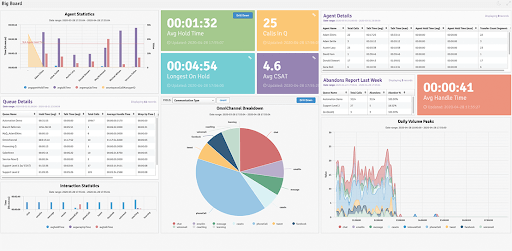
A Step-by-Step Guide to Search for Your Next Cloud Contact Center
Choosing the right cloud-based contact center solution is a complex decision with far-reaching implications. The investment of new software affects a lot of people — your customers, your agents, your IT team, and you. With ever-changing contact center trends and the challenges to meet new customer expectations, you have to account for tons of factors. You need to ask the right questions and gather supporting info to commit to a new cloud contact center system.
>> Download Now: 101 questions to ask on your contact center RFP
Sharpen’s cloud-based contact center platform is built to help organizations deliver faster, more personalized customer service while supporting agents with intuitive, AI-powered tools. With features like omnichannel communication, real-time analytics, and streamlined workflows, Sharpen removes common barriers to productivity and empowers teams to resolve issues with confidence. Exceed your performance goals and schedule a meeting with Sharpen today.
Below, we’ve put together a list of questions to ask agents and customers to ensure that your new cloud contact center will help you deliver the best experience:

Questions you should ask your customers, employees, and yourself before you research a new cloud contact center:
Before you invest in a new cloud-based contact center solution, you must understand the needs of your customers, employees, and leadership team will help you identify the capabilities that matter most and avoid costly missteps.
Ask yourself:
- What tools would relieve me of the most stress? Look for platforms that offer automation, centralized dashboards, or streamlined reporting features that reduce daily friction.
- Where do data gaps in my processes exist that new technology can help fix? If you’re manually piecing together metrics or struggling to access cross-channel customer data, it may be time for a platform with stronger integrations and real-time data visibility.
- What small tasks could software help me take off my plate from day to day? Identify repetitive tasks like call routing, agent scheduling, or QA tracking that could be handled more efficiently by software.
- What are some of the reporting or data capabilities I need to support my quality and workforce management? Consider whether your current tools provide enough insight into agent performance, customer satisfaction, and contact volume trends to support workforce and quality management.
Ask your agents:
- What parts of our current system are frustrating or inefficient? If agents toggling between multiple platforms or struggling to access customer information in real time, this is a clear indicator that a more unified, streamlined contact center solution is needed to reduce friction and improve efficiency.
- Do you get enough immediate feedback on your interactions to properly grow and develop? If agents are seeking detailed performance feedback, a platform with built-in coaching tools or real-time analytics can help.
- How easy is it to move between tasks and systems as you help a customer? Multitasking shouldn’t require extra effort. If agents are struggling to balance client interactions with routine tasks, evaluate whether current systems are hindering responsiveness.
- How many duplicate requests do you get from customers in a day? Duplicate inquiries can signal a breakdown in self-service tools or follow-up processes.
- Do you feel well connected and supported while working from home? A modern platform should include tools for collaboration, transparency, and real-time communication.
- How easy was it to learn to use your existing technology tools? If learning the system took weeks, new software with a more intuitive interface may be worth considering.
- How much visibility would you like to have on your service KPIs? Some agents may want more transparency into KPIs to track their own growth.
Ask your customers:
- What communication channels do you like to use to communicate with companies? Understanding channel preferences (phone, chat, email) helps prioritize omnichannel contact center capabilities.
- What are your most frequent issues and questions? Common issues may indicate where better knowledge base or call center solutions could reduce call volume.
- Do you wish you had access to better self-service tools or a smoother IVR to answer basic questions? Many customers want the ability to solve basic problems without waiting for an agent.
- Where are the major pain points in your customer experience? Pain points like long wait times, needing to repeat information, or lack of resolution signal areas for improvement.
Questions you should ask before you commit to a vendor:
Once you’ve gathered internal and external feedback, start evaluating vendors with those priorities in mind. Don’t simply commit to a vendor based on a feature list you found on their website or a nice looking pricing package. Ask the right questions before making an investment. Remember, you aren’t just buying a product. You’re investing in a relationship with a vendor partner. You need one that will support you long-term and help you reach your business goals.
1. How well will the system integrate with your existing tools?
This is the first question to consider before setting up meetings and demos with a new vendor. It wastes your time and energy to meet with a salesperson only to find out — welp, this cloud contact center won’t even work with my existing tools. It’s important that your new cloud system can share data and integrate with your other systems, like your CRM and your ticketing system.
Before committing to any vendor, work with your IT team to determine how your existing systems can and should integrate with new ones. You don’t want to be doubling up functionality with your new software if you already have tools that work. So, ensure that your new system can integrate with your other tools so your new software is worth the investment.
>> Read Next: A Guide to Change Management in your Cloud Contact Center: 4 Strategies to Align People and Processes
2. How reliable and secure is the service?
It’s true that technical difficulties are a legitimate challenge for any software vendor. Cloud systems can’t guarantee reliability 100% of the time.
But, you can’t afford for your cloud contact center to crash on a consistent basis. Ask potential software vendors what kind of uptime guarantees they have in place. You need a stable platform that supports your business needs around the clock. Do the vendors you’re shopping have downtime for required maintenance? And what does the impact look like for your team? Modern cloud technology vendors have a leg up, here, because software updates automatically push to their systems, making sure companies don’t have to schedule downtime for extensive updates.
In the same vein, security is an essential feature in a new cloud contact center. Hacks, data breaches, and ransomware attacks (unfortunately) occur often today. You want to make sure your new contact center system has security features that guarantee protection for your customers’ data and keep your company data secure
>> Learn more: Sharpen’s approach to security and compliance
3. How scalable is your system?
You always want to account for potential growth in your company. Sure, today you may only have a 20-seat contact center. But, over time your company will add customers, and you’ll need to support and hire more agents as your business grows. Can your cloud contact center solution scale to meet the needs of a 50-seat contact center? Or, a 70-seat contact center?
As you grow, your needs will likely grow in complexity, too. Find a contact center system that accounts for flexibility and can expand with you as you grow. Make sure your vendor keeps up with current trends and partners with you to help you to stay current. As you make changes to your processes or add to your team, you want to know that your technology can adapt. Don’t lock yourself into a solution that can’t keep pace with your growth.
4. Does the solution have good reporting tools?
Reporting and analytics are the key to successful workforce management. How can you assure your customers that you’ll deliver the best experience if you can’t analyze all the data you gather? Find a system that offers comprehensive and user-friendly reporting tools. Look for cloud technology that has customized reports and dashboards.

If you can make real-time data available to your agents, you can manage their performance and assess their growth minute-by-minute. How you present your data to your executive team and to your agents also matters. The more ownership you can have over your reports and dashboards, the more control you have over the continued growth of your team and service.
>> Learn More: Get the reports you need to make better decisions for your customers (and agents)
5. Does the software have omnichannel capabilities?
Customers today expect to reach you from multiple channels without any hiccups. In fact, 9 out of 10 consumers want an omnichannel experience with seamless service between communication methods. Omnichannel technology is essential for a modern cloud contact center. Your customers should be able to move from channel to channel, transferring their customer profile and data at every touchpoint.
Omnichannel support gives customers a more personalized experience. It gives your agents full context to address each customer’s issue effectively so they can do their job well. When your cloud technology can keep up with the latest trends in customer experience, you can stay on top of the ball in serving your customers. Look for omnichannel technology that prioritizes digital channels and contact center automation tools to keep your system up-to-date with the latest trends.
Transition to an AI-Forward Cloud Contact Center Solution
Investing in a cloud-based contact center solution is about building a stronger, more responsive customer experience. With Sharpen, companies gain a partner focused on long-term success, supporting both service excellence and employee performance. If your organization is ready to modernize its customer engagement strategy, schedule a meeting with Sharpen today.


